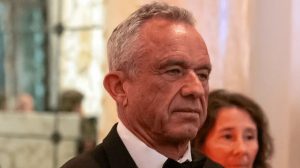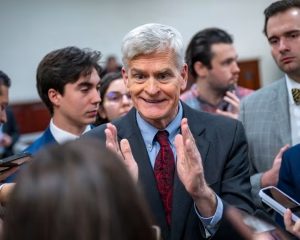Newsom goes to Washington for last-ditch help on climate

There are 68 days left for California to insulate its nation-leading pollution rules as best it can from President-elect Donald Trump — and Gov. Gavin Newsom is feeling the heat.
Newsom went to Washington on Tuesday to offer President Joe Biden a friendly reminder that come Jan. 20 — Trump’s first day in office — California will lose its power to enforce a big swath of its climate and clean air rules.
Trump has made it abundantly clear on the campaign trail that his administration will revoke the state’s permission under the Clean Air Act to enforce its zero-emission vehicle rules. His nomination Monday of former Rep. Lee Zeldin, a critic of New York’s electric vehicle policies modeled after California’s, to head U.S. EPA, has done nothing to assuage California’s fears.
“I was surprised that it came out so early, ahead of the traditional top tier appointments like Justice and Defense and State and Treasury,” said Bill Magavern, a policy director at Coalition for Clean Air. “I think it indicates that rolling back protections for our air and water is very high on the Trump agenda.”
So Newsom is trying to get those waivers — eight in total, covering everything from locomotives to leaf blowers. His office put the argument in broad terms Tuesday:
“Continuing California’s leadership — as the 5th largest economy in the world — in pushing for a more affordable and accessible cleaner, greener future is more important than ever,” he said in a statement. “We have no plans of slowing now.”
To be clear: Even if Biden does approve the waivers, Trump can revoke them, as he did last time for the one covering California’s tailpipe emissions rules for passenger vehicles.
But EPA took more than 18 months to do it last time. And if Biden doesn’t grant the waivers, it will be much easier for Trump to simply deny California’s outstanding requests, rather than going through a long administrative process to revoke already-granted permissions.
“It’s harder for the Trump administration to run the whole process of revoking waivers,” said Matt Davis, who worked as an EPA health scientist from 2009-19 and now serves as legislative director for the League of Conservation Voters. “It’s not hard at all to just can a waiver that’s not done yet, and both the careers and the political [appointees] at EPA are well aware of that fact.”
And while the most closely watched waiver requests, including zero-emissions mandates for passenger vehicles, commercial trucks and locomotives, are all but assured to face pushback from Trump’s EPA, lower-profile rules focused on electrifying harbor vessels and landscaping equipment could be less tempting to run through a lengthy administrative process.
“If you’re a Trump political appointee trying to look good and make your mark, it’s not a big prize to take those down,” Davis said.
Other California officials are more optimistic. Former President Barack Obama’s EPA approved seven waivers between the 2016 election and Trump’s inauguration in January 2017.
“I expect them all to get done again,” said California Air Resources Board member Hector De La Torre. “They’ve had them, they’ve been analyzing them, and we’ve been communicating with them all along. So it’s just a matter of wrapping it up.”
EPA spokesperson Shayla Powell said in a statement that the agency is “reviewing the requests closely to make sure its decisions are durable and grounded in the law.”
“Moving forward, the Biden-Harris EPA is committed to maintaining its successful track record fighting for cleaner air,” she added.
The industry groups most affected by the waivers are, so far, avoiding the issue. Chris Shimoda, senior vice president of the California Trucking Association, said the group is focused on improving an EV purchasing mandate for trucking fleets, regardless of whether Biden grants California a waiver to enforce it.
“We’re really just continuing to focus on the rule itself,” he said. “The regulation was not going to be feasible no matter who won the presidency.”
There are already signs Trump’s win is slowing California down. CARB took a zero-emission motorcycle rule off its agenda last week at the last minute. The agency hasn’t said why, but environmentalists assume it’s because the rule would need a waiver — making it No. 9.
“I don’t think there’s any doubt the election played a role,” Magavern said.


